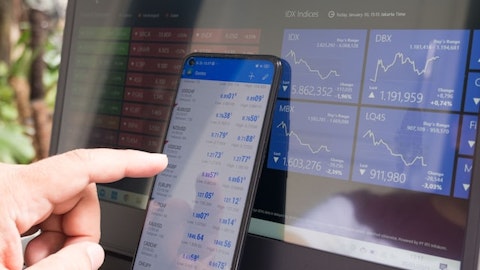MJ McNulty: Yes. So that’s a great question, Brett. It’s something we certainly talk about a lot. Our primary business is to acquire operating entities and have them under Acacia’s umbrella. And we do have some capacity to do things like that. I think we’re cautiously evaluating it. Our team is not in the business of originating and syndicating loans. So we would have to build out an effort to do that. We’ve certainly seen individual companies where we could put structured securities into them with returns that are kind of commensurate with what you’re suggesting. We’ve also seen loans that we could acquire and control fulcrum securities. What I would say is those are very interesting to us. Our primary objective here is to acquire operating businesses and have them in Acacia stable companies, but that doesn’t preclude us from evaluating some of these credit structure opportunities.
Brett Reiss: Okay. In terms of the thought process to go with a share buyback rather than declaring a dividend as a way to get the stock price up as potential currency for other deals, why did you go with the buyback versus declaring a dividend if you could share with me some of the thought process there?
MJ McNulty: Yes. I mean look, we — you can do either. I think from a tax perspective and from an optimization perspective, we think the buyback is attractive. And at the valuation of our stock today, I think it’s beneficial to our shareholders to own more of that stock. And so ultimately, our Board landed on a buyback as opposed to a dividend to accomplish stock hold.
Brett Reiss: Okay. On a scale of 1 to 10, 10 being metaphysical certainty, what would you — the Arix deal closing, what do you think it is, a 7, 8, 9?
MJ McNulty: I love it, Brett, when you ask me to put things on a scale. What I will tell you is that there is one condition to the closing of our, Acacia’s Arix shares to RTW. And that is approval from the Financial Conduct Authority in the United Kingdom for the transaction. I will say that the entity within Arix that triggered this approval requirement is currently FCA-approved or certified as is RTW. So I don’t want to handicap it, but we’re being advised that this is a routine approval process by the FCA. Now it’s — there are things that are out of our control, but that’s what we’re being advised.
Brett Reiss: Okay. Pivoting to the patent business, the jury award that we recently got, do you know when we’ll know whether the defendant will elect to appeal or just penny up and pay? What’s the timelines on that?
MJ McNulty: We do not have a specific timeline on that. The award in and of itself, the defendants have an opportunity to appeal that. They have an opportunity to settle that. That’s a process that we can’t comment anymore on. As I did mention, it has created some other productive conversations around that portfolio, and we’ll see how those play out.
Brett Reiss: Right. Right. And one last one on the patents. Do you know what the court calendar for firm trial dates with other defendants in the Wi-Fi 6 portfolio are over, let’s say, the next 6 to 9 months?
Kirsten Hoover: Do know in our — sorry, MJ.
MJ McNulty: Go ahead, Kirsten.
Kirsten Hoover: I was just going to say, we do disclose all trials, not just Atlas within the next 12 months, and that’s at 7. That is publicly disclosed in our 10-Q.
Brett Reiss: So in the 10-Q, there are 7 trial dates from 7 different defendants?
Kirsten Hoover: Yes.
Operator: Your next question is coming from John Levin from Levin Capital.
John Levin: Can you hear me?
MJ McNulty: We can hear you.
John Levin: You can hear me?
MJ McNulty: Yes.
John Levin: Okay. So it follows that question. So I think the award is $27 million. Is an inference — same kind of question of percentage. Inference of that, that is less than half of what you might ultimately obtain or a 1/4? What’s the potential magnitude here that this could produce because we know it’s significant?



